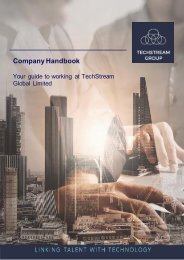20181119 BS EDITED TechStream Handbook WIP
Create successful ePaper yourself
Turn your PDF publications into a flip-book with our unique Google optimized e-Paper software.
1.4.3 Sick Cerificates<br />
After two consecutive day’s sick leave or in the event that you are sick more than two occasions within<br />
an eight-week period, and if you are absent from work on a Monday or Friday and/or the day before<br />
or after a public holiday, you must submit a sick certificate that was completed by a recognised medical<br />
practitioner. A certificate confirming the attendance at a clinic is not recognised as a sick certificate).<br />
Should management find, in their reasonable discretion, that there is a trend in your sick leave to the<br />
detriment of the Company; you will be required to produce a sick certificate for each and every day’s<br />
sick leave.<br />
1.4.4 Returning to work<br />
On your return to work you must report to your line manager who may conduct a return to work<br />
(RTW) meeting. The ‘return to work meeting’, is part of the normal management process to enable<br />
both the manager and member of staff to discuss the period of sickness and to see if any specific<br />
assistance is required to help them with a return to work, e.g. the need to attend follow up<br />
outpatient’s clinics etc.<br />
1.4.5 Benefits<br />
All the benefits to which you are entitled will continue to be paid during your period of sickness<br />
absence and your annual leave entitlement will continue to accrue during this period.<br />
1.5 Habitual Absence Management Policy<br />
1.5.1 Managing Habitual Absence<br />
A series of short-term absences can cause as much disruption as a longer period of sick leave and the<br />
early and successful management of these short-term absences is essential for the wellbeing of the<br />
employee and the efficient running of the organisation.<br />
It is important that an appropriate reporting of absence is done, where employees contact their line<br />
manager by telephone as the default expectation, on their first day of sickness. It is important that<br />
absent workers speak with their line managers about their condition so that managers can gauge what<br />
needs to be done during the absence. Subsequently, it is expected that a phone call from the employee<br />
to their manager is the required expectation as agreed with their line manager.<br />
1.5.2 Sickness Absence Triggers<br />
Where an employee reaches the following trigger points, a formal review of their attendance should<br />
take place, to ensure that the organisation has taken consideration if there is any required support for<br />
the employee, or if the employee needs to understand their contractual obligations to the<br />
organisation.<br />
The management of sickness is very important, as is the necessity to show that the organisation has<br />
done all that is reasonably possible to assist the employee in maintaining an appropriate level of<br />
attendance.<br />
<strong>TechStream</strong> Global Limited, Annexe A, Long Kloof Studios, Darters Road, Gardens, Cape Town, South Africa,<br />
8001 Tel: +27 (0) 21 422 0851 W: www.<strong>TechStream</strong>global.com<br />
Prod 03/2017. Page | 6






